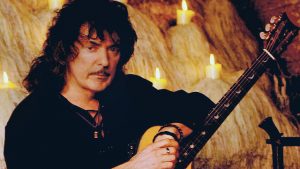
Adam Brent Houghtaling conducted an interview for Fender page where he’s got Ritchie Blackmore telling how he’s got into the most iconic of the iconic riffs ever “Smoke on the Water.” Take a look:
“The thick medieval groove Ritchie Blackmore summoned for Deep Purple’s massive 1973 hit, “Smoke on the Water,” has become synonymous with the word “riff”, and it’s possibly the first thing you ever learned to play.
Pantera’s Dimebag Darryl, speaking to Guitar World in 1993, called it “the ultimate simple tune” and revealed it was the first song he ever learned. “I learned it on the E string, then my dad taught me a chord and I thought it was as heavy as s**t. It’s simple, but totally bad-ass. It proves that you can play three notes and still make it killer.”
Speaking to Goldmine in 1994, Sonic Youth’s Thurston Moore recalled bands in his Connecticut high school playing the song, saying “[i]f they were really hot, they’d cover Deep Purple. I knew how to do ‘Smoke On The Water’ and ‘Sunshine Of Your Love’ and ‘In-A-Gadda-Da-Vida’.”
The story behind the song’s origin unfolds in the lyrics.
We all came out to Montreux
On the Lake Geneva shoreline
To make records with a mobile
We didn’t have much timeWhen Deep Purple began working on what would become 1972’s “Machine Head,” the group had already churned through a host of members and had coalesced into a successful, road-tested group with their fifth album, 1971’s “Fireball,” having reached the top of the album charts in their native U.K.
To work on material for their next album the band decamped to the small, lakeside town of Montreaux, Switzerland with the Rolling Stones’ Mobile Studio in tow—a portable recording studio referred to in the song as “the Rolling truck Stones thing” and used by Led Zeppelin, the Who, Dire Straits and many others.”
Watch an alive video of “Smoke on the Water” here:
https://youtu.be/ikGyZh0VbPQ
“On Dec. 4, 1971, Frank Zappa and the Mothers of Invention were 90 minutes into a set at the Montreaux Casino when a rowdy audience member fired a flare gun toward the theater’s aged wooden roof. It instantly caught fire.
Guitarist Ritchie Blackmore and the rest of the band watched as the building where they were set to record sent plumes of smoke billowing into the air across Lake Geneva and burned to the ground.
Claude Nobs—“Funky Claude” in the song and creator of the Montreux Jazz Festival—helped firefighters drag frantic concert-goers to safety. Afterwards, with the casino theater off the table as a studio, he helped set up the band at a small theater called the Pavillion.
They weren’t there long though as noise complaints brought the authorities. Blackmore recalled to Guitar Player in 2016 that they were in the middle of committing the song to tape when the local police began pounding on the theater doors. “Had the Montreux police had their way,” he said, “we never would’ve recorded ‘Smoke on the Water’.”
Blackmore recalls being aware of “trying to write something very, very simple and straightforward,” he told Guitar Player. Deep Purple drummer Ian Paice laid down a rhythm “and I basically played along,” he said.
A four-note blues scale melody in G minor, you can approach the riff in different ways depending on your skill level. Most learn it as a series of chunky barre chords, but Blackmore has explained that it’s a series of harmonized parallel fourths, plucked, never picked, in the third position.
Blackmore used his famous 1968 black Stratocaster to record the song—the first of many Stratocasters Blackmore would use throughout his career. Some short-plate reverb was added to his guitar along with echo on the solo that was supplied by a Revox tape recorder Blackmore used regularly in live settings to provide echo when needed, but also as an additional overdrive for solos. Blackmore’s guitar is panned left, while Jon Lord’s organ, which was run through a Marshall stack to better simulate a guitar sound, plays in unison, mixed right.
Finally, Funky Claude installed the band in the “empty, cold and bare” Grand Hotel, where they finished off “Smoke on the Water” and the remainder of the album.”
Watch the interview here:
I’m just a lucky guy who has chosen metal to live with for a long time. Metal changed my life for good. It made me more confident and stronger. Metalheads are naturally far away from the mass mediocrity and don’t accept impostures from anybody else. Metal is more than music, it’s a life changing oportunity!
